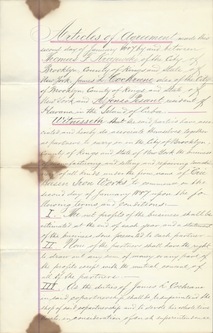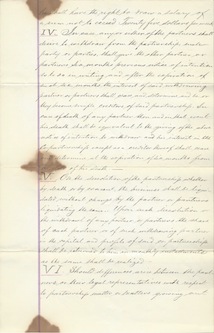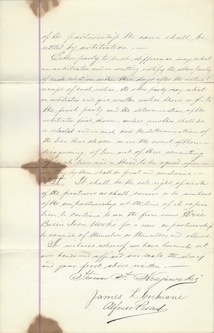


Thomas Florian Krajewski (pronounced cry-EFF-ski) was born in Warsaw, Russian Poland, on May 21, 1851. Thomas's parents were Wojciech Krajewski, who was born in 1810 and died in 1890, and Urszula Teodora Szymańska, who was born in 1824. Thomas's older sister, Leonida, was born in Warsaw in 1847. The family owned a brick business.
At about sixteen years of age, Thomas was expelled from school and sentenced to Siberia for the following incident as described by Grandmother Rose Krajewska, Thomas's widow: The Russian teacher remarked that the Poles were pigs, whereupon Thomas Krajewski stood up, and pointing, said, "the pigs come from the east [Russia]." The obituaries in the Paterson Press and the Herald state: "When a boy he took part in a revolution in Poland." He was arrested and put on a train to Siberia, but escaped and made his way across Europe to Zurich. There he enrolled in the Swiss Federal Institute of Technology in October 1868 at the age of seventeen to study mechanical engineering. He left in August 1871 with a "school-leaving certificate," but not a diploma. We have a transcript in German of his coursework.
He emigrated to America in October, 1871, and settled in Paterson, New Jersey, where he set out to pursue a career. He became a naturalized US citizen in 1878. Grandmother relates that, among other early assignments, he was sent to report on new technical developments at the Paris Exposition of 1879. He also developed and wrote an article on a railroad block signal system published in a scientific encyclopedia. The Times obituary states: "He wrote extensively on railroad signaling." Another obituary states: "He was connected at one time with the Grant Locomotive Works at Paterson, NJ, and later established his own company in Manhattan." Still another, this one in the Paterson Press, states: "He was on the engineering staff of one of the locomotive plants. He was an expert in that line and contributed an article on 'The Locomotive' to an encyclopedia."
On August 7, 1880, Thomas married Rose Schnell in Paterson. The following year, their daughter, Leonida, was born. When the machinery business was established, the family moved to Brooklyn, probably in the early 1890s.
Regarding other aspects of his life, the Paterson Press obituary states: "He was an intimate friend of his compatriot, the late Florian Oborski, and had charge of the fund with which a monument was erected to that lamented musical leader. Mr. Krajewski was a member of Joppa Lodge, No. 29, F., and A.M. of this city; and the Paterson Musical Union, and had many friends in Paterson."
In the late 1880s or early 1890s he developed and patented an improved sugar cane crushing machine capable of squeezing more juice out of raw cane. The machine required a huge flywheel which he designed to absorb the sudden energy demand of crushing each new load of cane. The steel companies in Pittsburgh told him it couldn't be made, but he worked with them until they succeeded together. He entered into a partnership with a Spaniard by the name of Alfonso Pesant and a man named James L. Cochrane. Together they formed the Erie Basin Iron Works to manufacture machinery. Krajewski was the engineer-designer, Pesant, with his contacts in Cuba, was the salesman, and Cochrane was the shop superintendent. They set up a shop in Manhattan near the Brooklyn Bridge.

|

|

|
The Krajewski family moved to Brooklyn Heights, living at one time on Montague Street. The cane crusher's superior efficiency enabled the Krajewski-Pesant Corporation to build a successful business in Cuba and Puerto Rico. Spanish planters were among the best customers. The business prospered, earning Krajewski a small fortune. The Paterson Press obituary states: "He retired from business in 1896 [at age 45] ..." Grandmother and Mother noted that the sugar cane crusher business was essentially ended by the Spanish/American war when the Spanish planters were forced to leave.
Grandmother described the how the business practices of the day and his good reputation enabled him to borrow money from the Hanover Bank "on a handshake."
The Krajewski-Pesant Company factory at 53 Jay Street (also known as 201 Water Street) in Brooklyn was built in 1905. This landmark three-story, 80,000 square-foot building is known for its large skylights. In more recent decades it was called the Jay Street Arts Building. A Googlemaps photo taken in 2014 shows the building under renovation, possibly for residential or mixed-use retail.
The neighborhood surrounding the factory was known at the time of its construction as Fulton Landing, after the ferry that connected Brooklyn with Manhattan. It's now known as Dumbo, for Down Under the Manhattan Bridge Overpass, home of many Internet startups and businesses, as well as artists and urban homesteaders.
A 1908 newspaper ad presents the Krajewski-Pesant Corporation as owned and operated, along with four other firms, by the United States & Cuban Allied Works Engineering Corporation of New York and Havana — offering the sugar cane crusher, boring mills, centrifugal machines, a Weston-type electric motor, and air and gas compressors. This consolidation or sale of the business occurred after he retired from active participation.
Leonida mentioned in a diary entry dated 1905 that Thomas had a brother named Sigmund and that he and their mother were then living in Warsaw. According to Grandmother, Thomas was known to his Polish family as "the rich brother in America" — when they asked for money, he never gave loans, but always outright gifts.
After suffering from strokes over a number of years, Thomas Krajewski died in New York on November 28, 1913. He was sixty-two years old. The obituary in the Paterson Press refers to him as "a member of a distinguished Polish family."
Thomas was buried at Cedar Lawn Cemetery in Paterson.
Questions: Residence, family members and history in Poland; when and where lived in Paterson and Brooklyn; church attended
Sources: Birth and church records, Poland, picture of great-grandfather, US immigration and naturalization records, New Jersey marriage records, Paris exposition records, scientific encyclopedia article, patent records, NY State business records, engraving of sugar cane crusher machine, and the Polish-language website Genealogical Descendants of the Great Diet.
Additional research by Paul Ford, Thomas's great-grandson.
Fudakowski-Krajewski family home